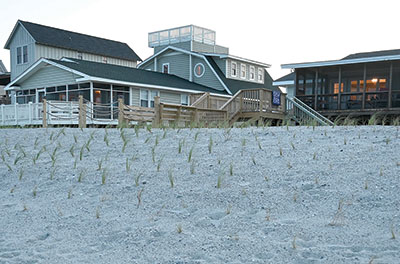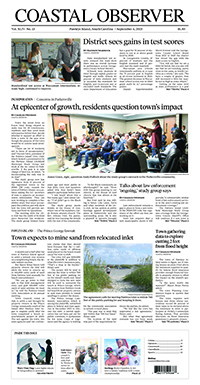Pawleys Island
Judge cuts fee award for owners in easement lawsuits

A Circuit Court judge cut over $100,000 from the claims of two Pawleys Island property owners seeking legal fees from the town for its failed attempt to condemn easements for beach renourishment.
The owners will get $8,000 each in legal fees and another $913.33 in costs, Judge Michael Nettles decided.
The ruling comes as the town has seen its legal expenses soar and Town Council is considering cuts in police to head off a projected shortfall in revenue in the coming years. The town does not have a municipal property tax. Most of its revenue comes from taxes on short-term rentals and fees collected on insurance premiums.
Frank Beattie and Sunset Lodge LLC had sought a total of $120,696.67 in legal fees. That was unreasonable, Nettles said in a ruling last week.
“While the case was not simple, it was nonetheless limited in scope and complexity,” Nettles said in his order.
The town initiated condemnation proceedings in 2020 to obtain easements across three lots on the island’s south end that would allow the Army Corps of Engineers to participate in the maintenance of 1.4 miles of renourished beach and make the area eligible for federal funds for future renourishment. The easements were the last of 113 that were required by the corps. (Other parts of the island aren’t eligible for federal funding because they lack sufficient public beach access.)
Beattie, Sunset Lodge and Barry Stanton challenged the condemnations, saying that it amounted to a taking of private property for public use without compensation and that the easements were no longer necessary because the town had already completed a project that placed 1.1 million cubic yards of offshore sand on 2.6 miles of beach. That
$14.8 million project was funded by the town and the state.
Stanton, a Columbia attorney, represented himself and the other owners. Beattie retired as an attorney after 53 years. Charlie Howard, who owns a third interest in Sunset Lodge, has been an attorney for over 50 years.
In January of this year, Nettles ruled that the town’s condemnation process failed to follow the requirements of the state’s Eminent Domain Procedure Act and so was invalid.
In granting the plaintiff’s motion for summary judgment, Nettles did not consider their claims that the condemnation should be blocked because the town acted in fraud or bad faith or because the easements were not necessary.
In quashing the condemnations started by the town, Nettles left the town the option of starting new proceedings that complied with the law.
A week after ruling for the property owners, Stanton submitted a request for $43,503.66 in fees each for Beattie and Sunset Lodge. He waived any fees for representing himself. The town challenged that amount.
As the dispute over fees continued, the property owners amended their request to account for additional time spent by Stanton on the suits. Through September, Stanton told the court he had spent $180,595 worth of time on the suits.
The town, represented by Will Dillard, argued that the fee request was excessive since the three suits were almost identical. It provided an affidavit from a Charleston attorney who specializes in eminent domain cases that said $8,000 would be appropriate, although Dillard said in a filing that “the most appropriate award to the plaintiff would be no award at all.”
Stanton argued that the cost of the litigation had been increased by the town filing additional motions, including one that sought to put the case on a fast track because hurricane season was approaching. He also claimed that the town conducted a “public misinformation campaign falsely characterizing the controversy.”
The judge said he reviewed arguments along with the billing records that were submitted by Stanton, and which remain sealed by the court.
“The underlying premise of the plaintiffs claim is that $180,595 worth of legal time was reasonably devoted to mostly simultaneous work on the three matters,” Nettles said.
He said that didn’t stand up under the eminent domain law or prior rulings by the state Supreme Court that set out the factors that determine what is reasonable for attorneys fees.
Those factors include the attorney’s qualifications, which Nettles called “commendable,” and his rates, which he called “reasonable” at $190 an hour. They also include the nature of the case, the time that needed to be spent on it and the outcome.
“Particularly with regard to the procedural claims on which the plaintiff prevailed and obtained relief, the case did not involve complex or difficult issues,” the judge said.
Stanton said he had worked just over 1,000 hours on the three cases. Before summary judgment was granted, his time worked out to 4.2 hours every weekday, including holidays, for six and a half months, Nettles said.
While Stanton provided standard fee statements, the judge said, “the Court finds it relevant that the fee statements and fee affidavits did not include itemization to shed light on the massive amount of attorney time presented.”
Even taking into account the actions of the town, “the claimed hours are excessive in light of the actual needs of the case,” Nettles said.
Much of the time was spent on “theories of fraud, bad faith and lack of necessity,” he said.
Those were not addressed.
“In this particular case, the relief obtained by the plaintiffs can be fairly characterized as limited and temporary in relation to the full scope of that they sought,” Nettles said.
He ordered judgments to be recorded against the town for a total of $18,708.25, including $881.59 for Stanton’s out-of-pocket costs.
While last week’s ruling ended one set of cases stemming from the condemnations, a second set is pending before the state Court of Appeals.
In an effort to correct flaws in its initial condemnation actions, the town last year filed a second set. Those were also challenged by the three south end property owners.
After the first condemnation attempt was quashed by Nettles, the town abandoned the second. The property owners sought to keep their challenges alive to conduct further discovery and get a permanent injunction to prevent future condemnations. If the town abandoned the effort, they said it should not be restarted.
Circuit Court Judge Ben Culbertson dismissed the second set of challenges, saying they were moot.
In their appeal brief, filed last month, the property owners argue that Culberton’s ruling was premature. “The Town’s sudden urgency to end the case when faced with discovery pointedly examining its motives, methods and rationale … did nothing but trumpet a lack of mootness,” Stanton said in his brief.
The town’s reply is due later this month.




